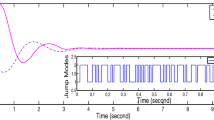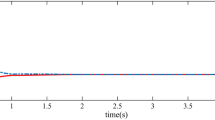Abstract
This paper researches the strict dissipative control problem for uncertain fuzzy neutral Markov jump systems by Takagi-Sugeno fuzzy rules. The asynchronous phenomenon is considered between the uncertain fuzzy neutral Markov jump systems modes and asynchronous fuzzy P-D feedback controller modes, which is described by a hidden Markov model. Via using linear matrix inequalities, the desired asynchronous fuzzy P-D feedback controller is obtained, which can ensure that the closed-loop uncertain fuzzy neutral Markov jump systems satisfies robustly exponential mean square stabilization with strict dissipativity. A numerical example and a single-link robot arm are utilized to demonstrate the effectiveness of the method.
Similar content being viewed by others
References
Tanaka K and Sugeno M, Stability analysis and design of fuzzy control systems, Fuzzy Sets and Systems, 1992, 45(2): 135–156.
Wu Z G, Dong S, Su H, et al., Asynchronous dissipative control for fuzzy Markov jump systems, IEEE Transactions on Cybernetics, 2018, 48(8): 2426–2436.
Cheng J, Park J H, Zhang L, et al., An asynchronous operation approach to event-triggered control for fuzzy Markovian jump systems with general switching policies, IEEE Transactions on Fuzzy Systems, 2018, 26(1): 6–18.
Li X, Lu D, Zhang W, et al., Sensor fault estimation and fault-tolerant control for a class of Takagi-Sugeno Markovian jump systems with partially unknown transition rates based on the reduced-order observer, Journal of Systems Science and Complexity, 2018, 31(6): 1405–1422.
Cui G, Yu J, and Shi P, Observer-based finite-time adaptive fuzzy control with prescribed performance for nonstrict-feedback nonlinear systems, IEEE Transactions on Fuzzy Systems, DOI: https://doi.org/10.1109/TFUZZ.2020.3048518.
Zhao T and Dian S, Fuzzy static output feedback H∞ control for nonlinear systems subject to parameter uncertainties, Journal of Systems Science and Complexity, 2018, 31(2): 343–371.
Zou M, Yu J, Ma Y, et al., Command filtering-based adaptive fuzzy control for permanent magnet synchronous motors with full-state constraints, Information Sciences, 2020, 518: 1–12.
Rakkiyappan R and Balasubramaniam P, On exponential stability results for fuzzy impulsive neural networks, Fuzzy Sets and Systems, 2010, 161(31): 1823–1835.
Cui G, Yu J, and Wang Q, Finite-time adaptive fuzzy control for MIMO nonlinear systems with input saturation via improved command-filtered backstepping, IEEE Transactions on Systems, Man, and Cybernetics: Systems, DOI: https://doi.org/10.1109/TSMC.2020.3010642.
Sun W, Su S, Wu Y, et al., A novel adaptive fuzzy control for output constrained stochastic non-strict feedback nonlinear systems, IEEE Transactions on Fuzzy Systems, 2021, 29(5): 1188–1197.
Zhuang G, Su S, Xia J, et al., HMM-based asynchronous H∞ filtering for fuzzy singular Markovian switching systems with retarded time-varying delays, IEEE Transactions on Cybernetics, 2021, 51(3): 1189–1203.
Yu J, Shi P, Chen X, et al., Finite-time command filtered adaptive control for nonlinear systems via immersion and invariance, SCIENCE CHINA Information Sciences, DOI: https://doi.org/10.1007/s11432-020-3144-6.
Xia J, Li B, Su S, et al., Finite-time command filtered event-triggered adaptive fuzzy tracking control for stochastic nonlinear systems, IEEE Transactions on Fuzzy Systems, 2021, 29(7): 1815–1825.
Liang H, Zhang L, Sun Y, et al., Containment control of semi-Markovian multiagent systems with switching topologies, IEEE Transactions on Systems, Man, and Cybernetics: Systems, 2021, 51(6): 3889–3899.
Shu Z, Lam J, and Xu S, Robust stabilization of Markovian delay systems with delay-dependent exponential estimates, Automatica, 2006, 42(11): 2001–2008.
Duan D and Zong G, Exponential L1 filtering of networked linear switched systems: An event-triggered approach, Journal of Systems Science and Complexity, 2020, 33(2): 383–400.
Zhang L, Liang H, Sun Y, et al., Adaptive event-triggered fault detection scheme for semi-Markovian jump systems with output quantization, IEEE Transactions on Systems, Man, and Cybernetics: Systems, 2021, 51(4): 2370–2381.
Xiao X, Park J H, Zhou L, et al., New results on stability analysis of Markovian switching singular systems, IEEE Transactions on Automatic Control, 2019, 64(5): 2084–2091.
Zhuang G, Ma Q, Zhang B, et al., Admissibility and stabilization of stochastic singular Markovian jump systems with time delays, Systems and Control Letters, 2018, 114: 1–10.
Xu S, Chen T, and Lam J, Robust H∞ filtering for uncertain Markovian jump systems with mode-dependent time delays, IEEE Transactions on Automatic Control, 2003, 48(5): 900–907.
Liu G, Xu S, Park J H, et al., Reliable exponential H∞ filtering for singular Markovian jump systems with time-varying delays and sensor failures, International Journal of Robust and Nonlinear Control, 2018, 28(14): 4230–4245.
Chen G, Sun J, and Chen J, Passivity-based robust sampled-data control for Markovian jump systems, IEEE Transactions on Systems, Man and Cybernetics: Systems, 2020, 50(7): 2671–2684.
Meng M, Xiao G, Zhai C, et al., Controllability of Markovian jump Boolean control networks, Automatica, 2019, 106: 70–76.
Chen G, Sun J, and Xia J, Robust sampled-data control for Ito stochastic Markovian jump systems with state delay, International Journal of Robust and Nonlinear Control, 2018, 28: 4345–4366.
Jiao T, Zheng W, and Xu S, Unified stability criteria of random nonlinear time-varying impulsive switched systems, IEEE Transactions on Circuits and Systems I: Regular Papers, 2020, 67(9): 3099–3112.
Zhuang G, Xia J, Feng J, et al., Admissibility analysis and stabilization for neutral descriptor hybrid systems with time-varying delays, Nonlinear Analysis: Hybrid Systems, 2019, 33: 311–321.
Chaouki A and El Abed A, Finite-time and fixed-time synchronization of inertial neural networks with mixed delays, Journal of Systems Science and Complexity, 2021, 34(1): 206–235.
Zhang D, Cheng J, Ahn C K, et al., A flexible terminal approach to stochastic stability and stabilization of continuous-time semi-Markovian jump systems with time-varying delay, Applied Mathematics and Computation, 2019, 342: 191–205.
Wang W and Zhang H, H∞ filtering for continuous-time systems with pointwise time-varying delay, Journal of Systems Science and Complexity, 2012, 25(1): 90–104.
Qian W, Xing W, and Fei S, H∞ state estimation for neural networks with general activation function and mixed time-varying delays, IEEE Transactions on Neural Networks and Learning Systems, 2021, 32(9): 3909–3918.
Qian W, Li Y, Zhao Y, et al., New optimal method for L2 − L∞ state estimation of delayed neural networks, Neurocomputing, 2020, 415: 258–265.
Zhuang G, Xia J, Feng J, et al., Admissibilization for implicit jump systems with mixed retarded delays based on reciprocally convex integral inequality and Barbalat’s lemma, IEEE Transactions on Systems, Man, and Cybernetics, 2021, 51(11): 6808–6818.
Faydasicok O, A new Lyapunov functional for stability analysis of neutral-type Hopfield neural networks with multiple delays, IEEE Transactions on Neural Networks, 2020, 129: 288–297.
Chen Y, Qian W, and Fei S, Improved robust stability conditions for uncertain neutral systems with discrete and distributed delays, Journal of the Franklin Institute, 2015, 352(7): 2634–2645.
Zhuang G, Xu S, Xia J, et al., Non-fragile delay feedback control for neutral stochastic Markovian jump systems with time-varying delays, Applied Mathematics and Computation, 2019, 355: 21–32.
Chen N, Peng J, Gui W, et al. Asynchronous fuzzy cognitive networks modeling and control for goethite iron precipitation process, Journal of Systems Science and Complexity, 2020, 33(5): 1422–1445.
Wu Z, Shi P, Shu Z, et al., Passivity-based asynchronous control for Markov jump systems, IEEE Transactions on Automatic Control, 2017, 62(4): 2020–2025.
Dong S, Wu Z, Su H, et al., Asynchronous control of continuous-time nonlinear Markov jump systems subject to strict dissipativity, IEEE Transactions on Automatic Control, 2019, 64(3): 1250–1256.
Zhao X, Liu W, and Yang C, Coordination control for a class of multi-agent systems under asynchronous switching, Journal of Systems Science and Complexity, 2019, 32(4): 1019–1038.
Jiao T, Park J H, and Zong G, Stability criteria of stochastic nonlinear systems with asynchronous impulses and switchings, Nonlinear Dynamics, 2019, 97: 135–149.
Zhuang G, Sun W, Su S, et al., Asynchronous feedback control for delayed fuzzy degenerate jump systems under observer-based event-driven characteristic, IEEE Transactions on Fuzzy Systems, DOI: https://doi.org/10.1109/TFUZZ.2020.3027336.
Liu W and Li P, Disturbance observer-based fault-tolerant adaptive control for nonlinearly parameterized systems, IEEE Transactions on Industrial Electronics, 2019, 66(11): 8681–8691.
Li H, Wu Y, and Chen M, Adaptive fault-tolerant tracking control for discrete-time multi-agent systems via reinforcement learning algorithm, IEEE Transactions on Cybernetics, 2021, 51(3): 1163–1174.
Liang H, Zhou Y, Ma H, et al., Adaptive distributed observer approach for cooperative containment control of nonidentical networks, IEEE Transactions on Systems, Man, and Cybernetics: Systems, 2019, 49(2): 299–307.
Lin G, Li H, Ma H, et al., Human-in-the-loop consensus control for nonlinear multi-agent systems with actuator faults, IEEE/CAA Journal of Automatica Sinica, 2022, 9(1): 111–122.
Sun W, Xia J, and Wu Y, Adaptive tracking control for mobile manipulators with stochastic disturbances, Journal of Systems Science and Complexity, 2019, 32(5): 1393–1403.
Liu W, Ma Q, Xu S, et al., Adaptive finite-time event-triggered control for nonlinear systems with quantized input signals, International Journal of Robust and Nonlinear Control, 2021, 31(10): 4764–4781.
Liang H, Liu G, Zhang H, et al., Neural-network-based event-triggered adaptive control of nonaffine nonlinear multiagent systems with dynamic uncertainties, IEEE Transactions on Neural Networks and Learning Systems, 2021, 32(5): 2239–2250.
Ma H, Li H, Lu R, et al., Adaptive event-triggered control for a class of nonlinear systems with periodic disturbances, SCIENCE CHINA Information Sciences, 2020, 63(5): 150212.
Dong G, Cao L, Yao D, et al., Adaptive attitude control for Multi-MUAVs with output dead-zone and actuator fault, IEEE/CAA Journal of Automatica Sinica, 2021, 8(9): 1567–1575.
Zhou Q, Zhao S, Li H, et al., Adaptive neural network tracking control for robotic manipulators with dead-zone, IEEE Transactions on Neural Networks and Learning Systems, 2019, 30(12): 3611–3620.
Yang X, Cheng Z, Li X, et al., Exponential synchronization of coupled neutral-type neural networks with mixed delays via quantized output control, Journal of the Franklin Institute, 2019, 356(15): 8138–8153.
Wang C, Li H, and Zhang M, Asynchronously switching control for a class of switched neutral systems: A novel discontinuous Lyapunov function approach, IET Control Theory and Applications, 2020, 14(17): 2663–2673.
Du P, Liang H, Zhao S, et al., Neural-based decentralized adaptive finite-time control for nonlinear large-scale systems with time-varying output constraints, IEEE Transactions on Systems, Man, and Cybernetics: Systems, 2021, 51(5): 3136–3147.
Willems J, Dissipative dynamical systems, Part I: General theory, Archives of Rational Mechanical Analysis, 1972, 45: 321–351.
Willems J, Dissipative dynamical systems, Part II: Linear systems with quadratic supply rates, Archives of Rational Mechanical Analysis, 1972, 45: 352–393.
Zhang Y, Ma Y, Fu L, et al., Reliable robust control for semi-Markovian jump sampled-data systems based on a dissipativity unified framework, International Journal of Control, Automation and Systems, 2019, 17: 2059–2068.
Kim S H, Asynchronous dissipative filter design of nonhomogeneous Markovian jump fuzzy systems via relaxation of triple-parameterized matrix inequalities, Information Sciences, 2019, 478: 564–579.
Chen G, Xia J, and Zhuang G, Delay-dependent stability and dissipativity analysis of generalized neural networks with Markovian jump parameters and two delay components, Journal of the Franklin Institute, 2016, 353: 2137–2158.
Author information
Authors and Affiliations
Corresponding author
Additional information
This work was supported by the National Natural Science Foundation of China under Grant Nos. 62173174, 61773191, 61973148, 62003154; Plan for Outstanding Youth Innovation Team in Shandong Higher Education Institutions under Grant No. 2019KJI010; the Natural Science Foundation of Shandong Province for Outstanding Young Talents in Provincial Universities under Grant No. ZR2016JL025; Undergraduate Education Reform Project of higher Education in Shandong Province under Grant No. M2018X047; Liaocheng University Education Reform Project Foundation under Grant Nos. G201811, 26322170267.
Rights and permissions
About this article
Cite this article
Wang, J., Zhuang, G., Xia, J. et al. Asynchronous Dissipative Control and Robust Exponential Mean Square Stabilization for Uncertain Fuzzy Neutral Markov Jump Systems. J Syst Sci Complex 35, 1374–1397 (2022). https://doi.org/10.1007/s11424-021-1005-4
Received:
Revised:
Published:
Issue Date:
DOI: https://doi.org/10.1007/s11424-021-1005-4




